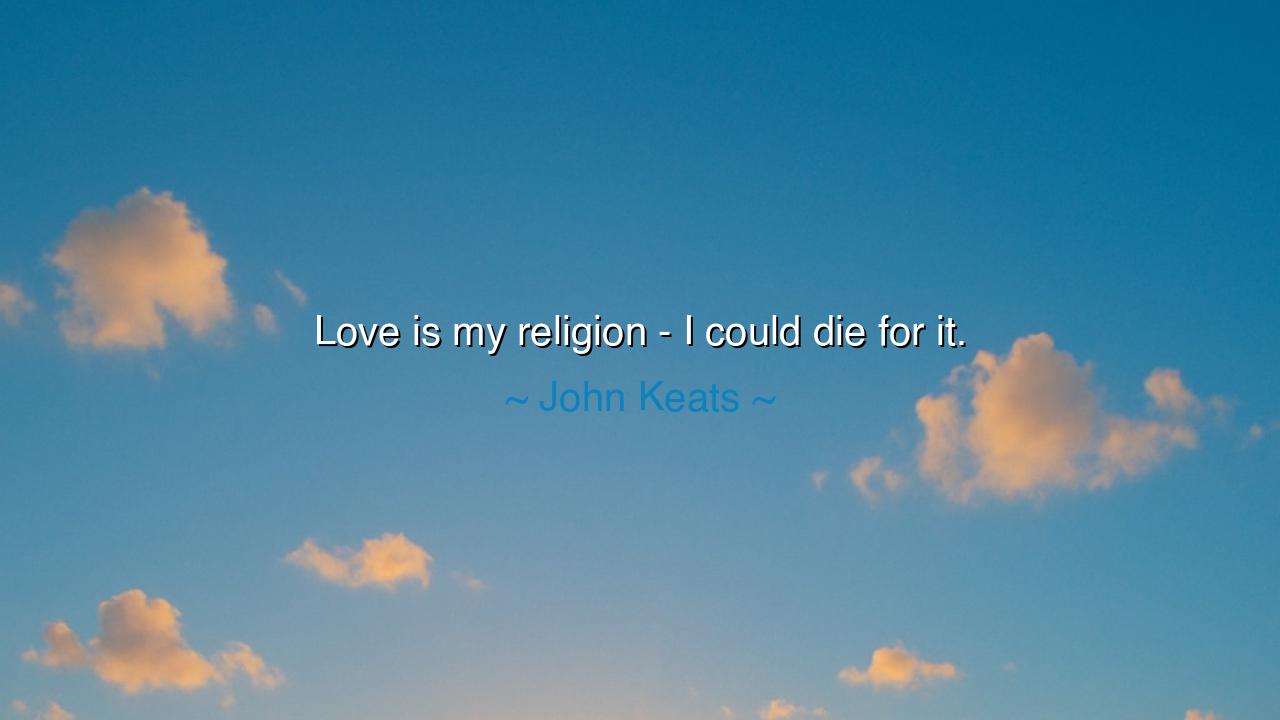
Love is my religion - I could die for it.






"Love is my religion - I could die for it." These powerful words, spoken by the poet John Keats, evoke a truth that stretches beyond mere romantic affection and into the very core of the human soul. Keats, through his impassioned declaration, speaks of love as the highest calling, the ultimate devotion, the very essence that gives life meaning and purpose. In this quote, love is not just an emotion, but a faith—a force so profound that it shapes one’s existence and guides every thought, every action, every sacrifice. Love, in its purest form, becomes something we are willing to live for, and in some cases, willing to die for, because it is the ultimate source of truth, beauty, and life.
In the ancient world, love was often seen as both a divine gift and a spiritual pursuit. The Greeks spoke of Eros, the god of love, whose power was so strong that it could drive people to madness, to passion, and to profound transformation. In their eyes, love was a force that reached beyond the physical realm, a connection to the gods themselves. Plato, in his dialogue The Symposium, explored the idea that love was a pathway to truth and wisdom, a divine force that led the soul toward the highest and most beautiful ideals. For the ancients, love was not a fleeting feeling; it was a sacred experience, a calling that demanded dedication and sacrifice—qualities that Keats would echo in his profound reflection on love.
Consider, for a moment, the story of Antigone, the tragic figure from Sophocles' play. Antigone’s love for her brother, Polynices, was so strong that she defied the orders of the king, risking her own life to give him a proper burial. Her love was a religion, a force so powerful that she was willing to face death rather than betray it. She believed in the sacredness of her love and honor, placing it above the laws of men, and her ultimate sacrifice became a symbol of devotion so pure that it transcended the mortal realm. In this way, Antigone’s actions illustrate what Keats expresses in his quote—love is a sacred belief that demands everything, even life itself.
Similarly, the life of Socrates, the great philosopher of ancient Athens, reveals the depth of commitment that love can inspire. Socrates was a man who loved wisdom above all else, and he believed that his quest for truth was so important that he was willing to die for it. When faced with the death sentence for corrupting the youth and disrespecting the gods, Socrates chose to accept his fate rather than abandon his principles and his love for knowledge. His commitment to his love for truth and wisdom was as strong as any religious devotion, and he embodied the belief that love is not just an emotional attachment but a life-altering force that can guide us through the most difficult of decisions. Just as Keats declares that love is his religion, Socrates demonstrated that his devotion to truth was his guiding principle, one worth dying for.
Keats, in this quote, also acknowledges a fundamental truth about the nature of love—that love can be both transformative and consuming. When we truly love, we are often willing to give up everything for it. Love becomes a religion in the sense that it governs the way we live our lives and makes us sacrifice for something greater than ourselves. It does not simply stay as a feeling or a fleeting passion but becomes an all-consuming force that shapes our thoughts, actions, and decisions. This intensity of love, as Keats implies, is not something to be taken lightly. It demands a depth of commitment that goes beyond casual affection and touches on something divine, something that can fill the emptiness of life with meaning and purpose.
The lesson that Keats’ quote offers is one of devotion. If we are to love deeply and truly, we must be prepared to give ourselves entirely to it, to make love the center of our existence, and to sacrifice for it. This is not to suggest that we should seek martyrdom or blind devotion, but rather that true love requires us to give up our selfishness and ego in service of a greater good. Love is not merely a feeling, but a force that asks us to grow, to evolve, and to transcend our limitations. It calls us to see beyond the surface and understand the deeper connections we share with others. When we love in this way, it changes us—it becomes a guiding light that informs how we treat the world and those around us.
In your own life, reflect on the ways in which love shapes your world. Is it a passing feeling, or is it a guiding force that informs your decisions, your actions, and your relationships? Are you willing to embrace love as a sacred principle, one that requires not just moments of joy but also commitment and sacrifice? Love, when we embrace it as Keats did, transforms us into something greater. Let it guide your life, and in doing so, you will find that love becomes not just an emotion, but a religion—one that fuels your purpose and helps you to live with meaning and devotion, shaping the world around you as you walk your path.






AAdministratorAdministrator
Welcome, honored guests. Please leave a comment, we will respond soon